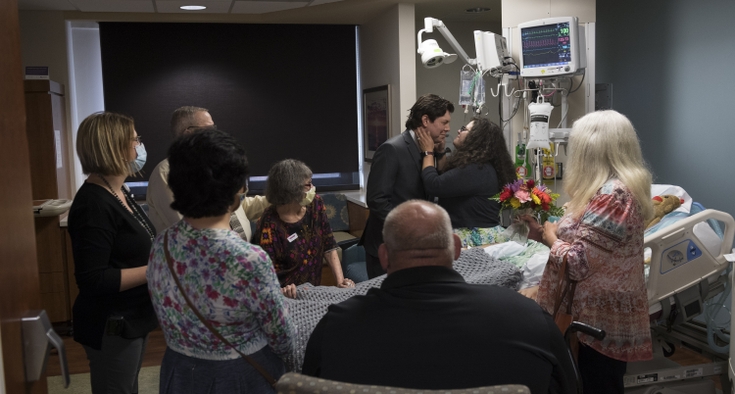Thomas Ansbro had plenty of reasons to be cautious about venturing out too much during the pandemic in early 2021. The 72-year-old retired psychologist in Salisbury lives with Parkinson’s disease and a heart condition. His physicians had implanted a pacemaker and a defibrillator to regulate his heart, plus a vascular port to allow quick delivery of life-sustaining medication.
His primary motivations for staying well were his wife, Patricia, a psychologist at W.G. (Bill) Hefner Veterans Affairs Medical Center in Salisbury, and their daughters, Allana and Erin. The planning had already started for Allana’s October wedding at Sacred Heart Catholic Church in Salisbury. Thomas was determined to escort his daughter down the aisle.
He never imagined he would endure multiple hospitalizations in the months before the wedding, with another bombshell to come.
Bacteria in the blood

When Thomas grew listless and ran a fever in February 2021, his primary care physician urged him to seek treatment at Novant Health Rowan Medical Center in Salisbury. Dr. Abayomi Agbebi, director of infectious diseases, diagnosed him with bacteremia, or bacteria in the blood. Even worse, Thomas also had sepsis – a potentially life-threatening condition in which the body tries to fight off infection but develops serious inflammation in the process.
Agbebi suspected an infection started in Thomas' port and migrated into the pacemaker. He prescribed intravenous antibiotics, which Thomas could take at home. Initially, the infection cleared up. A later blood test revealed it had returned. This time things were getting worse.
With Thomas’ deteriorating state, Agbebi was concerned. “He’s got chronic medical conditions. He’s older. He's one of the patients who I’d worry about the most because he ticks too many of the boxes for developing severe infection.”

The foreign devices in his body – the pacemaker, defibrillator and port – could give bacteria a place to hide and flourish when conditions were right. They all needed to be removed. Thomas could live without them.
His cardiac team at Duke University Medical Center conducted the procedure in the spring. Thomas was recovering at home when his fever, confusion and weakness returned. The cause: a urinary tract infection, again accompanied by sepsis.
This time, Agbebi took a new approach, prescribing an ongoing antibiotic to suppress infection. To everyone’s joy and relief, it worked.
Patricia prayed that Thomas’ condition had stabilized. They had already endured so much. “He's exceeded all expectations,” Patricia added. “I think he's maybe past his nine lives.”
Thomas was about to test No. 10.
Antibody infusion treatment for COVID-19
Patricia couldn’t believe it. They had struggled with one potentially fatal infection after another for months, and now this, a few weeks before their eldest daughter would be married.
The treatment uses antibodies developed specifically to fight COVID-19. When successful, it restrains how much the virus spreads through the body and invades the cells. Patricia would receive the infusion, too, to provide further protection for her husband.
A physician can prescribe the antibody treatment without a COVID-19 diagnosis if a patient has been exposed to COVID-19 and has key risk factors. Those include being over 65, being immunocompromised and having a chronic medical condition such as diabetes, lung disease or heart disease. “As long as you're not on oxygen and don't require hospitalization, you may qualify for an infusion,” Agbebi said.At home, Thomas, coughing and showing other symptoms, tested positive for COVID-19. Patricia, charged with monitoring his oxygen level four times a day, was terribly upset. Agbebi sent her messages through Novant Health’s online portal, MyChart, to hang in there and hold on. It would take 24 hours to see an improvement with the antibody treatment.
Were there moments when Thomas thought the end might be near? “About a dozen,” he said, only half-joking.
But he steadily gained strength during his two-week quarantine. On Oct. 23, Thomas escorted Allana down the aisle, assisted by his brother, who guided his wheelchair.
For Thomas and Patricia, after a year to forget, this holiday season has been one to remember.









